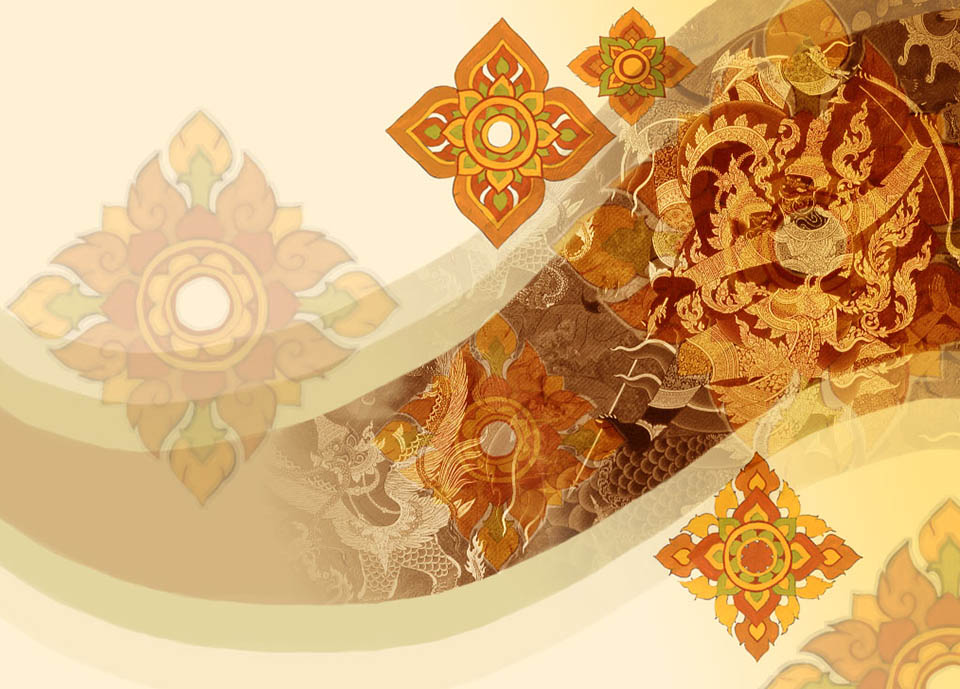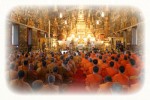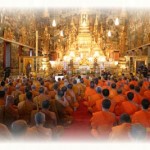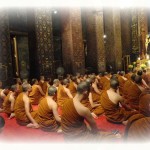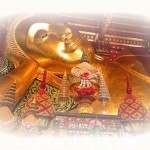Buddhist Evening Prayer Chanting- Tam Wat Yen
Evening Prayers are the most Regularly practiced Prayers, due to the fact that not everybody is awake when Morning Prayers are held. In the Thai regional Provinces, most people are Farmers and rise early, to give alms and attend the Morning Prayer session, but in the Cities it is not so common to see people attending Morning Prayers. The Practice of Evening Prayer is an essential part of the preparation for Meditation and Vipassana practice. Part of the Prayers deal with the act of Apologizing to the Buddha, Dhamma and Sangha for any eventual mistakes or unintended Insults one may have made against them. This in turn, when properly Apologized with true heartfelt regret, then can clear the subconscious mind from any Karmic Residue such as guilt, which can become a block preventing further advancement in Meditation and Dhamma practice. It is important to Apologize and repent for actions speech or thoughts which were harmful or selfish, or any abuses of the Dhamma we may have committed. The practice of Prayer Chanting is also a form of Meditation, and Contemplation of the Dhamma, especially when the meaning of the Prayers are Understood whilst Chanting.
This Evening Prayer Page is in Pali Phonetics and English Translation, in order to increase your Understanding and the Depth of your experience when Praying, and to give access to the Potential Spiritual rapture that can arise from Chanting the Dhamma with Understanding.
This Page is intended to Assist Foreign Lay Practitioners, and Potential Candidates for Ordination into the Sangha, to deepen the experience of Buddhist Prayer Chanting, and open a Path of Access to the correct method of Chanting Thai Buddhist Morning Prayers, with a correct Understanding of what those prayers mean. Even in Thailand, many Temples are beginning to Chant in both Pali and Thai, because it has become ever more recognized that the benefits of Prayer Chanting are truly at their Utmost when the person Chanting actually Understands the Meaning of what they are saying.
Evening Chant
Words of Worshipping the Triple Gem
Yo So Bhagavaa
Arahang Sammaasambuddho
(To him; the Blessed One, the Accomplished One, the Supremely Self-enlightened one, having extinguished all the flames of desires and becomes rightly enlightened through His own efforts,)
Svaakkhaato yena Bhagavataa
dhammo
(To the teachings of the Blessed One which are well-expounded,)
Supatipanno yassa bhagavato
saavakasangho
(And to the disciples of the Blessed One who are well-practiced,)
Tammayang Bhagavantang
sadhammang sasanghang
(We worship the Blessed One, His teachings and His disciples,)
Imehi sakkaarehi yathaarahang aaropitehi abhipuujayaama.
(With these proper offerings, to render supreme homage.)
Saadhu no bhante bhagavaa
Suciraparinibbutopi
(It is beneficial for us that the Blessed One, having passed away for long but leaving the great benefits behind.)
Pacchimaajanataanukampamaanasaa
(The Blessed One has great compassion to us who are the later generation.)
Ime sakkaare
Duggatapannaakaarabhuute
patigganhaatu
(May the Blessed One accepts these offerings of ours,
For our long-lasting welfare and for our long-lasting happiness.)
Amhaakang digharattang hitaaya
Sukhaaya.
(For our long-lasting welfare and for our long-lasting happiness.)
Arahang Sammaasambuddho
Bhagavaa.
(The Buddha is the Accomplished one, the Supremely Self-enlightened One, the Blessed One who has extinguished all the flames of desires and becomes rightly enlightened through His own efforts,)
Buddhang bhagaavantang
Abhivaademi.
(I pay homage to the Buddha, the Awakened and the Blossomed One who is well knowledgeable.)
(prostrate)
Svaakkhaato bhagavataa dhammo.
(The teachings of the Buddha are well—expounded.)
Dhammang namassaami.
(I salute those teachings of the Buddha with joined palms.)
(prostrate)
Supatipanno bhagavato
Saavakasangho.
(The disciples of the Buddha have practiced well,)
Sanghang namaami.
(I bow down with respect to them.)
(prostrate)
Pubbabhaaganamakaara
Handa mayang Buddhassa Bhagavato pubbabhaaganamakaarang karoma se.
(Now let us pay preliminary homage to the Buddha.)
Namo tassa Bhagavato
(Homage to him, the Blessed One,)
Arahato
(The Accomplished One,)
Sammaasambuddhassa.
(The Supremely Self-enlightened One)
(repeat 3 times)
Buddhaanussati
Handa mayang buddhaanussatinayang karoma se.
(Now let us chant the recollection of the Buddha)
Tang kho pana Bhagavantang evang kalyaano kittisaddo abbhuggato,
(Thus far and wide has the reputation of the Blessed One spread:)
Itipi so Bhagavaa
(Because of reasons such as these that the Blessed one is,)
Arahang Sammaasambuddho,
(Having attained nibbaana, the Supremely Self-enlightened One,)
Vijjaa caranasampanno
(the Perfect Embodiment of Wisdom and Virtue,)
Suhato
(the Auspicious Path—finder,)
Lokaviduu,
(the Knower of all realms,)
Anuttaro purisadammasaarathi
(the Incomparable Tamer of individuals,)
Satthaa devamanussaanang
(the Supreme Master of devas and men, )
Buddho
(the Awakened One who is knowledgeable, self—awakened and blossoming by virtue of the Dhamma,)
Bhagavaati.
(And also One possesses the ability to teach the Dhamma selectively.)
Buddhabhigiti
Handa mayang Buddhaabhigiting karoma se.
(Now let us chant the supreme descriptive praise of the Buddha.)
Buddhavaarahantavarataadigunaabhiyutto
(The Buddha is endowed with fine virtues such as the sublime virtues of an arahant.)
Suddhaabhinaanakarunaahi samaagatatto
(In him could be found profound insight and pure compassion.)
Bodhesi yo sujanatang kamalangva suuro
(He makes the righteous men awakened like the sun makes the lotus blossomed.)
Vandaamahang tamaranang sirasaa jinendang.
(I join my palms in the gesture of respect and how to Him who has no defilements.)
Buddho yo sabbapaaninang saranang khemamuttamang
(Any Buddha at all, is one who is the highest and secure refuge for all living beings.)
Pathamaanussatitthaanang vandaami tang sirenahang
(I bow low to that Buddha, the Exalted One who forms the basis for my first factor of recollection.)
Buddhassaahasmi daaso va (women:daasi va) Buddho me saamikissaro
(I am indeed the servant of the Buddha, the Buddha is my great Master.)
Buddho dukkhassa ghaataa ca vidhaataa ca hitassa me
(The Buddha is my suffering- destroyer and my benefit—bestower as well.)
Buddhassaahang niyyaademi sariranjivitancidang
(To the Buddha. I sacrifice my body and my life.)
Vandantohang (women:Vandantihang) carissaami Buddhasseva subodhitang
(I, who revere the Exalted One, will walk His excellent path of awakening.)
Natthi me saranang annang Buddho me saranang varang
(I have no other refuge, the Buddha is my superb refuge.)
Etena saccavajjena vaddheyyang satthu saasane
(By the declaration of this truth, may I be prosperous in the teachings of the great Master.)
Buddhang me vandamaanena (women:vandamaanaaya) yang punnang pasutang idha
(I, who revere the Exalted One, and with the merits have I obtained,)
Sabbepi antaraayaa me mahesung tassa tejasaa.
(May all dangers be overcome through their power.)
(prostrate and recite)
Kaayena vaacaaya va cetasaa va
(Whether by body, speech or mind.)
Buddhe kukammang pakatang mayaa yang
(Whichever evil karma have I committed towards the Buddha,)
Buddho patigganhatu accayantang
(May the Buddha forgive me for the whole fault,)
Kaalantare sangvaritung va Buddhe.
(For the sake of later restraint towards the Buddha.)
Dhammaanussati
Handa mayang dhammaanussatinayang karoma se.
(Now let us chant the recollection of the Dhamma.)
Svaakkhaato Bhagavataa dhammo,
(the dhamma is well expounded by the Exalted One.)
Sanditthiko
(It is something which one who learns and truly practice will realize by one’s own self.)
Akaaliko
(It is also something which can be actually practiced and yields results without the limitation of time.)
Ehipassiko,
(It is also something worthy of telling the others to take heed of)
Opanayiko
(And it is something ought to be respectfully observed and adopted.)
Paccattang veditabbo vinnuuhiti.
(As it is something that can be only realized through personal experience.)
Dhammaabhigiti
Handa mang Dhammaabhigiting karoma se.
(Now let us chant the supreme praise of the dhamma.)
Svakkhaatataadigunayogavasena seyyo
(The teachings of the Buddha are something sublime because they consist of all the virtues as well-expounded by Him.)
Yo maggapaakapariyatti vimokkhabhedo
(It is divided into Path, Fruit, Pariyatti (the scriptures) and Nibbana.)
Dhammo Kulokapatanaa tadathaarithaari
(It keeps those who uphold it froin falling into the world of evil.)
Vandaamahang tamaharang varadhammametang.
(I revere that superb Dhamma. Which removes all darkness.)
Dhammo yo sabbapaaninang saranang khemamuttamang
(The Dhamma is the highest and secure refuge for all living beings.)
Dutiyaanussatitthaanang vandamitang sirenahang
(I bow low to the Dhamma which forms the basis for my second factor of recollection.)
Dhammassaahasmi daaso va (women:dasi va) dhammo me samilissaro
(I am indeed the servant of the Dhamma, the Dhamma is my great Master.)
Dhammo dukkhassa ghaataa ca vidhaataa ca hitassame
(The Dhamma is my suffering destroyer and mv benefit-bestower as well.)
Dhammassaahang niyaademi sariranjivitancidang
(To the Dhamma I sacrifice my body and my life.)
Vandantohang (women:Vandantihang) caressaami dhammasseva sudhammatang
(I, who revere the Dhamma. will walk the Dhamma’s excellent way.)
Natthi me saranang annang dhammo me saranang varang
(I have no other refuge, the Dhamma is my superb refuge.)
Etena saccavajjena vaddheyyang satthu saasane
(By the declaration of this truth.
may I be prosperous in the teachings of the great Master.)
Dhammang me vandamaanena (women:vandamaanaaya) yang punning pasutang idha
(I, who revere the teachings of the Buddha, and with the merits have I obtained,)
Sabbepi antaraayaa me mahesung tassa tejasaa.
(May all dangers be overcome through their power.)
(prostrate and recite)
Kaayena vaacaaya va cetasaa va
(Whether by body, speech or mind,)
Dhamme kukammang pakatang mayaa yang
(Whichever evil karma have I committed towards the Dhamma,)
Dhammo patigganhatu accayantang
(May the Dhamma forgive me for the whole fault.)
Kaalantare sangvaritung va dhamme.
(For the sake of later restraint towards the Dhamma.)
Sanghaanussati
Handa mayang Sanghaanussatinayang karoma se.
(Now let us chant the recollection of the Sangha.)
Supatipanno Bhagavato saavakasangho,
(Of good conduct is the community of noble disciples of the Exalted One.)
Ujupatipanno Bhagavato saavakasangho,
(Of upright conduct is the community of noble disciples of the Exalted One)
Naayapatipanno Bhagavato saavakasangho
(Of right conduct is the community of noble disciples of the Exalted One, who practise in order to know well the Dhamma which frees one from suffering.)
Saamicipatipanno Bhagavato saavakasangho.
(Of proper conduct is this community of noble disciples of the Exalted One.)
Yadidang
(The noble disciples of the Exalted One are such people namely,)
Cattaari purisayugaani attha purisapuggalaa,
(The four pairs of men, the eight of individuals.)
Esa Bhagavato saavakasangho,
(This community of noble disciples of the Exalted One is:)
Ahuneyyo
(Worthy of gifts,)
Paahuneyyo
(Worthy of hospitality, )
Dakkhineyyo
(Worthy of offerings,)
Anjalikaraniyo,
(Worthy of reverential salutation, and)
Anuttarang punnakkhettang lokassaati.
(Worthy of the in comparable field of merit for the world.)
Sanghaabhigiti
Handa mayang Sanghaabhigiting karoma se.
(Now let us chant the supreme praise of the Sangha.)
Saddhammajo supatipattigunaadiyutto
(The Sangha that is arisen from the Dhamma, comprises such virtue as good moral practice.)
Yotthabbidho ariyapuggalasanghasettho
(They form the group of eight types of Noble people.)
Silaadidhammapavaraasayakaayacitto
(They are guided in body and mind by excellent morality and other virtues.)
Vandaamahag tamariyaana ganang susuddhang.
(To that group of morally pure Noble people I pay my respect.)
Sangho yo sabbapaaninang saranang khemamuttamang
(For it is the Sangha that is the highest and secure refuge of all living beings.)
Tatiyaanussatitthaanang vandaami tang sirenahang
(To that Sangha who form the basis for the third recollection. I pay my gesture of respect.)
Sanghassaahasmi daaso va (women:dasii va)
Sangho me saamikissaro
(I am indeed the servant of the Sangha, the Sangha is my great master.)
Sangho dukkhassa ghaataa ca vidhaataa ca hitassa me
(The Sangha is my suffering destroyer and my benefit-bestower as well.)
Sanghassaahang niyyaademi sariranjiivitancidang
(To the Sangha I sacrifice my body and my life.)
Vandantohang(women:Vandantiihang)
Carissaami sanghassopatipannatang
(I, who revere the Sangha’s excellent well practised way.)
Natthi me saranang annang
Sangho me saranang varang
(I have no other refuge, the Sangha is my superb refuge.)
Etana saccavajjena vaddheyyang satthu saasane
(By the declaration of this truth, may I be prosperous in the teachings of the great Master.)
Sanghang me vandamaanena (women:vandamaanaaya) yang punnang pasutang idha
(I, who revere the Sangha, and with the merits have I obtained,)
Sabbepi antaraayaa me maahesung tassa tejasaa.
(May all dangers be overcome through their power.)
(prostrate and recite)
Kaayena vaacaaya va cetasaa vaa
(Whether by body, speech or mind,)
Sanghe kukammang pakatang mayaa yang.
(Whichever evil karma have committed towards the Sangha,)
Sangho patigganhatu accayantang
(May the Sangha forgive me for the whole fault.)
Kaalantare sangvaritung va Sanghe.
(For the sake of later restraint towards the Sangha.)
(end of evening chants)
Abhinhapaccavekkhana
Handa mayang abhinhapaccavekkhanapathang bhanaama se.
(Now let us chant the ideas to be constantly reviexed.)
Jaraa dhammomhi Jarang anatito (women:anatiitaa),
(I’m subject to decay. I cannot escape decay.)
Byaadhidhammomhi Byaadhing anatiito (women:anatiitaa)
(I am subject to disease. I cannot escape disease.)
Maranadhammomhi Maranang anatiito (women:anatiitaa)
(I am subject to death. I cannot escape death.)
Sabbehi me piyehi manaapehi naanaabhaavo vinaabhaavo,
(There will be division and separation from all that are dear to me and beloved.)
Kammassakomhi Kammadayaado (women:Kammadaayaadaa)
(I am the owner of my karma. I am in the heir to my karma.)
Kammayoni Kammabandhu Kammapatisarano (women:Kammapatisaranaa),
(I am born of my karma. I am related to my karma. I am abide dependent on my karma.)
Yang kammang karissaami
(Whatever karma have I committed,)
Kalyaanang vaa paapakang vaa
(Be it good or evil,)
Tassa daayaado (women:daayaadaa) bhavissaami.
(I am bound to reap the fruit of that karma.)
Abhinhang paccavekkhitappang.
(Thus, these facts should be again and again contemplated.)
(Leader recites) Ayang kayo
(Everyone recites) This body;
Acirang vata
(Is not long lasting)
Apetavinnaano
(When it is devoid of consciousness,)
Chuddo
(When consciousness discards it,)
Adhisessati
(This body will lie down,)
Pathaving
(On the earth)
Niratthanva kalingarang.
(Like a useless log.)
(Leader recites) Sankhaaraa
(Everyone recites;) All conditioned things;
Aniccaa vata
(Are impermanent,)
Uppaadavayadhammino
(They have the nature of being arisen and declined.)
Uppajjitvaa nirujjhanti
(They have the nature of being arisen and ceases.)
Tesang vuupasamosukho.
(Nibbaana is the extinction of the whole defilements and suffering and it is the great bliss.)
(Leader recites) Sabbe sattaa
(Everyone recites) All livng beings;
Maranti ca maringsu ca marissare
(Who are dying, died and going to die.)
Tathevaahang marissaami
(It is the same as me who will die too.)
Natthi me ettha sangsayo.
(As for death, I have no dorbt about it.)
Evening Transference of Merit
Uddissanaadhitthaana Gaathaa
Handa mayang uddissanaadhitthaanagaathaayo bhanaama se.
(Now let us recite the verses on the transference of merit and the verses of selr-determination)
Iminaa punnakammena
(I transfer this merit that is arisen from my practice to:)
Upajjhaayaa gunuttaraa
(My preceptor of great virtue,)
Aacriyuupakaaraa ca
(My teachers who encourage me,)
Maataa pataa ca naatakaa
(My father, my mother and my relatives,)
Suriyo candimaa raajaa
(The sun, the moon and the king,)
Gunavantaa naraapi ca
(The virtuous people and high ranking people,)
Lokapaalaa ca devataa
(The World guardian god and the devas,)
Yamo mittaa manussaa ca
(The lord of death, the friends and the human beings,)
Majjhattaa verikaapi ca
(The indifferent and the hostile,)
Sabbe sattaa sukhii hontu
(May all beings be happy and free from unsatisfactoriness.)
Punnaani pakataani me
(May the wholesome deeds have I performed,)
Sudhang ca tividhang dentu
(Bring you threefold bliss.)
Khippang paapetha vo matang.
(And help you immediately attain Nibbaana.)
Iminaa punnakammena
(By this act of performing the wholesome deeds,)
Iminaa uddisena ca
(And through this act of sharing,)
Khippaahang sulabhe ceva
(May I likewise attain the eradicating of -)
Tanhupaadaanachedanang
(Craving and clinging.)
Ye santaane hinaa dhammaa
(Whatever unwholesome deeds I have in my mind,)
Yaava nibbaanato mamang
(Till I attain Nibbaana,)
Nassantu sabbadaa yeva
(May they be immediately come to an end -)
Yattha jaato bhave bhave
(Whinever I am born,)
Ujucittang satipannaa
(May I have an upright mind, mindfulness and excellent wisdom,)
Sallekho viriyamhinaa
(May these three virtues work together to uproot all defilements.)
Maaraa labhantu nokaasang
(May there be no chance for all harmful influences-)
Kaatunca viriyesu me
(To weaken my efforts.)
Bhuddhaadhipavauo naatho
(The Buddha is the supreme refuge.)
Dhammo naatho varuttamo
(The Dhamma is the supreme refuge.)
Naatho Paccekabuddho ca
(The Silent Buddha and -)
Sangho naathottaro mamang
(The Sangha are my true refuges.)
Tesottamaanubhaavena
(By the power of these supreme ones -)
Maarokaasang labhantu maa
(May the evil ones lose their chance)
Dasapunnaanubhaavena
(Through the power of the ten wholesome deeds,)
Maarokaasang labhantu maa.
(May all evil ones cease to manifest their power.)
Document is published by www.dharmathai.com for free Distribution Only and is not permitted to be Sold
Editing without Permission or removal of Credits is not Permitted
Credits;
Kritanut Wattana; Text transliteration – please visit his website on Thai Culture; Of Siam
Ajarn Spencer Littlewood; Spell Check and Translation Check
Original Research Source; Buddhist Manual – Morning and Evening Chants (Thai-Pali-English), Translated and Compiled by Associate Prof. Dr. Suchitra Onkom
ISBN 978-974-8480-07-7
first Published to Celebrate the Awarding of Doctorate degree in Buddhist Studies at Maha Julalongkorn University to Luang Por Jaran of Wat Ampawan (Singhburi).
The aim of the book was to enable Foreigners to be able to Chant Buddhist Prayers when attending Thai Theravada Buddhist Practice Centers and Temples, both in and outside of Thailand
Related Links
Morning Prayers (Thai Buddhist Chanting)- Morning Chant – Worshipping the Triple Gem in Thai Buddhism
Kata Chinabanchorn of Somdej Dto Prohmrangsri (Wat Rakang Kositaram)
